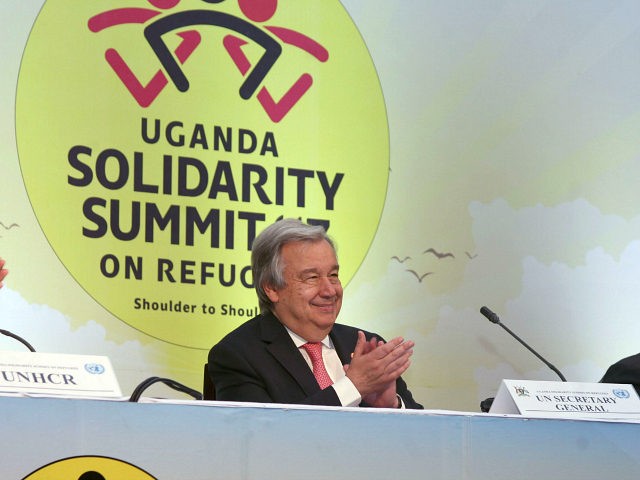United Nations Secretary-General Antonio Guterres this week hailed Uganda’s “exemplary” approach to refugees while scolding the developed world for closing its borders. A Washington Post article called Uganda “the best place in the world to be a refugee.”
But the praise of the African country’s approach dismisses the nation’s hellish human rights record and the fact that a number of refugees have fled that country to the U.S.
At a press conference this week, Guterres praised Uganda’s approach and compared it to the “irrational” debate about migration happening in some developed countries. He noted that Uganda, which borders on war-torn South Sudan, has been generous in accepting refugees coming across its northern border.
“Uganda last year received three times more refugees from South Sudan than those crossing the central Mediterranean, and you all know the enormous impact in public opinion and political debates that the movement through the central Mediterranean caused last year,” he said, before noting he was about to visit Uganda for a “solidarity summit”:
It’s a message of solidarity given the extreme generosity of the Ugandan people and government in the face of number of refugees it is hosting – 1.3 million, 950,000 from South Sudan alone – with open borders, open doors, open hearts, sharing resources, sharing land, which is really exemplary in a world where unfortunately so many borders and doors are closed.
European Union commissioner Christ Stylishness meanwhile hailed the Ugandan approach as “an example for the whole region and the world.”
An opinion piece in the Washington Post by Eric Schwartz, President of Refugees International, asked: “Why is Uganda more welcoming to refugees than the United States?”
At a time when the U.S. government in particular seems determined to treat refugees as a nuisance and a risk, Uganda has emerged as an example of compassion and generosity toward refugees. Wealthier nations could learn much from its example.
Another Washington Post article painted this Uganda a rosy refugee paradise, where refugees “are given large plots of land” and treated with more apathy than in the West. This is presented as a good thing: “Unlike many in Western countries… Ugandans have hardly batted an eye at the influx.”
Why then, are refugees from places such as Yemen, Libya, and Somalia not fleeing to nearby Uganda instead? The answer is that there are many aspects to Uganda that means it is far from being a modern-day Eden.
One problem is the crippling poverty Uganda faces, exacerbated by their open refugee policy. Even those pushing Uganda as a model to follow recognizes that the country cannot sustain the current situation, and is calling for Western developed countries to stump up billions in aid.
The United Nations, backed by Uganda’s government, is appealing for a whopping $8 billion from the international community to deal with the refugee crisis out of South Sudan. A UNICEF statement this week said that the refugee crisis is placing “excessive pressure” on community resources and social services and the money is needed for “both emergency response and resilience interventions to Uganda’s refugee and refugee-hosting population over the next four years.”
Also avoided in praise about Uganda is any discussion of the nation’s appalling human rights record. Homosexuality is criminalized and is an imprisonable offense, with Human Rights Watch reporting that police torture suspected gay people and perform “forced anal examinations” on those suspected of breaking the law.
Meanwhile, the report found that elections were not free and fair and that the police have used live ammunition to break up peaceful gatherings of political opponents, while journalists have also been beaten and arrested. President Yoweri Museveni’s main opponent was arrested, detained at home and eventually charged with treason and sent to prison, while his supporters were beaten.
The report also notes that the maligned United States provides over $440 million a year to help Uganda’s struggling health service, while it funds the Ugandan army to the tune of $70 million.
The poor human rights condition appears to be reflected in numbers from the State Department that show that since October, there have been 2,507 refugees already from Uganda.
Schwartz’s article concedes that Uganda’s record “is not spotless.”
“It has been accused of playing a destructive role in the internal affairs of South Sudan, and the large movement of refugees into the country has caused plenty of internal tensions. And other practices in Uganda, such as harsh discrimination against the LGBT community, are very disturbing,” he conceded.
However, it seems that even these horrific human rights violations are not enough to prevent such advocates from pushing U.S. and other developed nations to imitate Uganda.
Adam Shaw is a politics reporter for Breitbart News based in New York. Follow Adam on Twitter: @AdamShawNY.

COMMENTS
Please let us know if you're having issues with commenting.